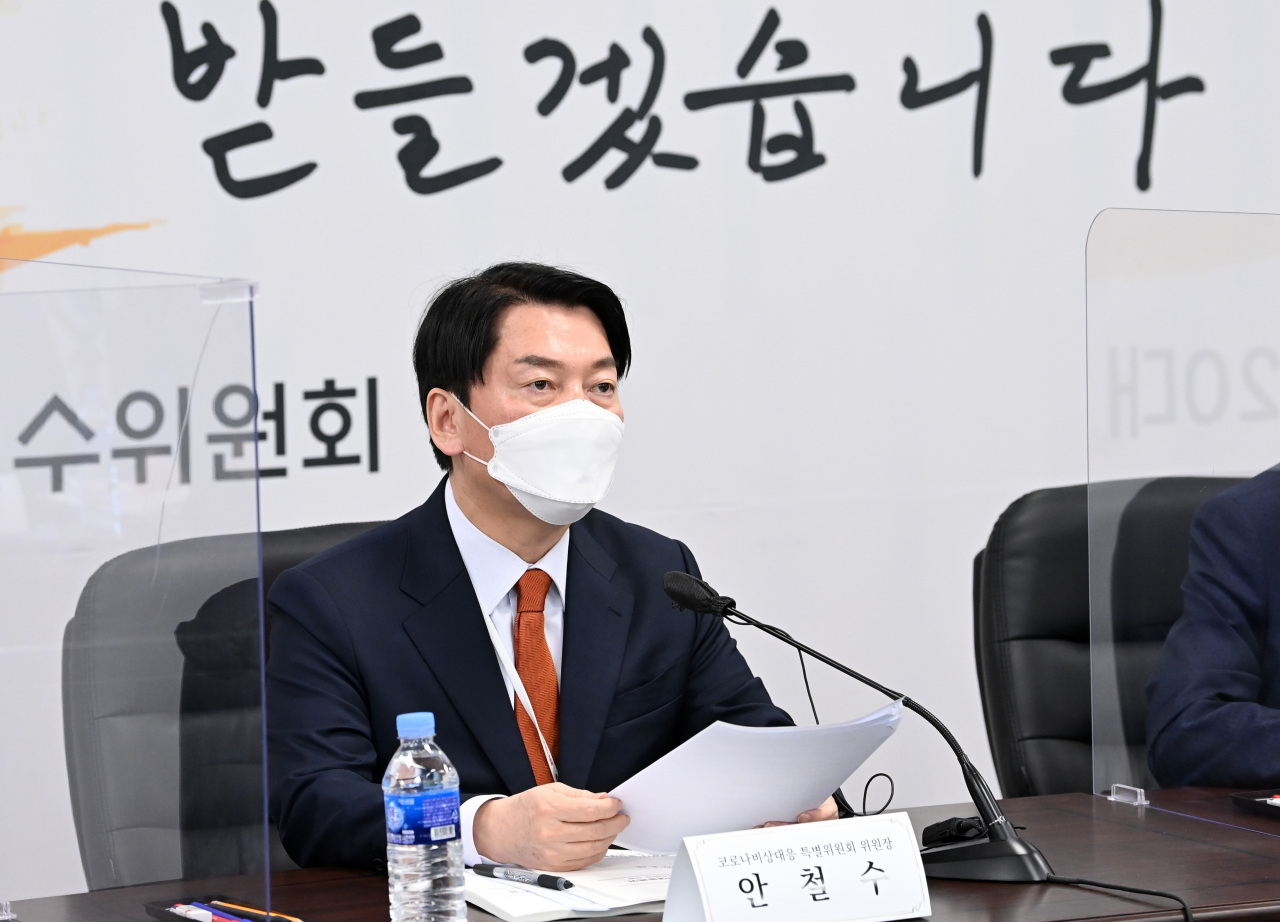
SEJONG -- The first phase of real estate policy of the incoming Yoon Suk-yeol administration will be unveiled in an appropriate timing, said Ahn Cheol-soo, chairman of the presidential transition team, on Monday.
But the transition team said that the unveiling timing will be later than this week, suggesting that internal discussions were still underway. It also denied the rumors that the comprehensive housing policy will be publicized before lawmakers at the National Assembly.
Spokespeople at the transition team, explaining Ahn’s intention, hinted that the housing policy may not be made public before Yoon’s inauguration on May 10. They said the team was wary of possible confusion in the market in case of an impetuous announcement.
These remarks came after Land Minister nominee Won Hee-ryong said earlier in the day that he and Deputy Prime Minister and Finance Minister nominee Choo Kyung-ho were poised to publicize details, involving their philosophy, on the real estate policy during the National Assembly’s coming confirmation hearings on the nominees.
A core interest in the market is the new administration’s home supply plan in the Seoul-Gyeonggi Province-Incheon metropolitan area and deregulation measures for mortgages.
In line with the president-elect’s earlier pledges, the transition team has reportedly mapped out details on making concrete Yoon’s plan to provide about 1.4 million home units in the Greater Seoul area.
An issue is whether the transition team will unveil a policy to remove a ban on the development of greenbelt areas in Seoul, as well as apartment reconstruction and land redevelopment plans.
While the transition team had dismissed the possibility of removing the greenbelt ban, some property market insiders have continued to raise the possibility.
Simultaneously, concerns are growing over a feasible spike in real estate prices in some districts, given that housing supply plans should frequently be accompanied by specification of particular locations.
Another point is revision of the loan-to-value ratio, as Yoon had pledged to raise the LTV ratio up to 70 percent for single-home owners. This, theoretically, would enable a household to take out 700 million won ($567,000) in a mortgage for the purchase of a home for 1 billion won.
Those, who had not owned any homes in their life, could be allowed to enjoy a LTV ratio of up to 80 percent, according to Yoon’s earlier pledges.
Despite possible easing of LTV rules, there is a possibility that the transition team will not move to deregulate the debt-service ratio, under which banks take the redemption capability of borrowers into consideration. Yoon had not commented on the DSR rule during the presidential campaign.
A real estate agent said the coming administration would be prudent in implementing deregulations -- not to stimulate property prices -- before the June 1 local elections.
Since March, home prices in Seoul’s pricey Gangnam-gu and Seocho-gu have recently shown signs of a climb in reflection of expected upcoming deregulation.
By Kim Yon-se (kys@heraldcorp.com)
But the transition team said that the unveiling timing will be later than this week, suggesting that internal discussions were still underway. It also denied the rumors that the comprehensive housing policy will be publicized before lawmakers at the National Assembly.
Spokespeople at the transition team, explaining Ahn’s intention, hinted that the housing policy may not be made public before Yoon’s inauguration on May 10. They said the team was wary of possible confusion in the market in case of an impetuous announcement.
These remarks came after Land Minister nominee Won Hee-ryong said earlier in the day that he and Deputy Prime Minister and Finance Minister nominee Choo Kyung-ho were poised to publicize details, involving their philosophy, on the real estate policy during the National Assembly’s coming confirmation hearings on the nominees.
A core interest in the market is the new administration’s home supply plan in the Seoul-Gyeonggi Province-Incheon metropolitan area and deregulation measures for mortgages.
In line with the president-elect’s earlier pledges, the transition team has reportedly mapped out details on making concrete Yoon’s plan to provide about 1.4 million home units in the Greater Seoul area.
An issue is whether the transition team will unveil a policy to remove a ban on the development of greenbelt areas in Seoul, as well as apartment reconstruction and land redevelopment plans.
While the transition team had dismissed the possibility of removing the greenbelt ban, some property market insiders have continued to raise the possibility.
Simultaneously, concerns are growing over a feasible spike in real estate prices in some districts, given that housing supply plans should frequently be accompanied by specification of particular locations.
Another point is revision of the loan-to-value ratio, as Yoon had pledged to raise the LTV ratio up to 70 percent for single-home owners. This, theoretically, would enable a household to take out 700 million won ($567,000) in a mortgage for the purchase of a home for 1 billion won.
Those, who had not owned any homes in their life, could be allowed to enjoy a LTV ratio of up to 80 percent, according to Yoon’s earlier pledges.
Despite possible easing of LTV rules, there is a possibility that the transition team will not move to deregulate the debt-service ratio, under which banks take the redemption capability of borrowers into consideration. Yoon had not commented on the DSR rule during the presidential campaign.
A real estate agent said the coming administration would be prudent in implementing deregulations -- not to stimulate property prices -- before the June 1 local elections.
Since March, home prices in Seoul’s pricey Gangnam-gu and Seocho-gu have recently shown signs of a climb in reflection of expected upcoming deregulation.
By Kim Yon-se (kys@heraldcorp.com)







![[Graphic News] More Koreans say they plan long-distance trips this year](http://res.heraldm.com/phpwas/restmb_idxmake.php?idx=644&simg=/content/image/2024/04/17/20240417050828_0.gif&u=)
![[KH Explains] Hyundai's full hybrid edge to pay off amid slow transition to pure EVs](http://res.heraldm.com/phpwas/restmb_idxmake.php?idx=644&simg=/content/image/2024/04/18/20240418050645_0.jpg&u=20240419100350)





![[From the Scene] Monks, Buddhists hail return of remains of Buddhas](http://res.heraldm.com/phpwas/restmb_idxmake.php?idx=652&simg=/content/image/2024/04/19/20240419050617_0.jpg&u=20240419175937)

![[KH Explains] Hyundai's full hybrid edge to pay off amid slow transition to pure EVs](http://res.heraldm.com/phpwas/restmb_idxmake.php?idx=652&simg=/content/image/2024/04/18/20240418050645_0.jpg&u=20240419100350)

![[Today’s K-pop] Illit drops debut single remix](http://res.heraldm.com/phpwas/restmb_idxmake.php?idx=642&simg=/content/image/2024/04/19/20240419050612_0.jpg&u=)